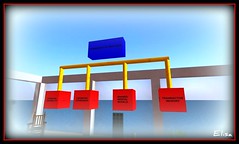Researching Learning in Virtual Environments -
ReLIVE08Welcome to the website for ReLIVE08 - 20th and 21st November 2008.
Keynote speakers: Edward Castranova and Roo Reynolds.
In response to demand we will be webcasting all keynote sessions and a selection of presentations live during ReLIVE08. We will also be providing a live blog to coordinate other blogs during the conference. Please check back to this page for the URLs as they become available.
The conference cafe will be available inworld at
http://slurl.com/secondlife/Open%20Life/196/126/27 from the 10th of November.
The conference proceedings will be available after the conference.
With researchers and practitioners attending from around the globe, this excellent opportunity for networking promises an interesting, stimulating and exciting 2 days. The conference will begin with a reception on the evening of the 19th November, and the first full day will see the opening keynote from Edward Castranova and a varied programme of paper presentations, symposia and workshops with presenters from around the world. The conference gala reception and dinner will be supported by a variety of entertainment including a digital caricaturist, live music and the internationally renowned Terry Waite as our after dinner speaker. The second day begins with an invited panel debate including Edward Castranova, Roo Reynolds, Bill Thompson and Claudia Linden, chaired by Sara De Freitas, Director of Research at The Serious Games Institute. This is followed by more presentations and workshops with a networking lunch. We end the second day on a high with a keynote plenary led by Roo Reynolds.
All delegates will receive a conference goodie bag and an electronic copy of the conference proceedings with ISBN reference. Selected papers will be invited to submit chapters for an edited book with a major publisher in the field (tbc).
Who should attend?
If you are currently researching learning in a virtual world, for example There, CyberTown, Second Life etc, then we invite you to submit an abstract to ReLIVE08. We are seeking presenters and participants who have experience of designing and delivering learning in virtual worlds, and the ability to reflect on and share that experience in an analytical framework.
Conference themes
The conference has four broad themes, listed below. Papers, workshops, symposiums, posters and inworld events submitted to these themes should draw on existing research or planned programmes of inquiry. The conference organisers are keen to construct a programme that features diverse and innovative research approaches to learning and teaching in virtual worlds. Given the emerging practice associated with virtual worlds, the conference committee are also keen to receive papers reporting on the experience of learning and teaching using virtual worlds that relate practice and outcomes to literature and research in this area. We anticipate that submissions will reflect a range of research methods and will examine issues such as rigour, methods of sampling, relationships between researchers and researched, and the ethics and politics of the research process.
The themes listed are intended to be broad and papers etc are likely to cross over two or more themes. In any proposal please ensure that you indicate clearly how you are addressing key points in the following:
Crossing boundaries and making connections
Papers submitted to this theme will extend our knowledge of the interdisciplinary nature of research into learning and teaching in virtual worlds. Boundaries crossed might include the digital divide between first and second lives, subject areas and/or research disciplines. In particular, papers should outline research processes and outcomes which draw upon or extend conceptual and explanatory frameworks from computing, cognitive science, social sciences and/or education.
Opportunities and challenges of virtual worlds for learning and teaching
Papers submitted to this theme may wish to report on research directly related to issues such as: ethics associated with online representations; disclosure; child protection issues; enabling disadvantaged learners. Of additional interest are papers where opportunities and/or challenges were unforeseen at the beginning of a research programme and had a subsequent impact upon the research outcomes.
Approaches to research
This theme intends to explore the range of research approaches utilised by researchers of learning and teaching in virtual worlds. The committee are particularly interested in reviewing researchers who are adopting a range of methodologies both quantitative and qualitative. Of particular interest are accounts that highlight the efficacy of particular approaches and the pitfalls of others and/or that illuminate issues concerned with the collection of data in-world versus real-world.
Implementing and sustaining innovation
Papers submitted under this theme should explore issues associated with implementing and sustaining institutional teaching strategy in virtual worlds. Of particular interest are papers that focus on Institutional or Faculty approaches; adoption roadmaps; resourcing strategies and/or impact measures.
Questions that might be answered include but are not limited to:
What are the best practices for human research in VWs? What are the ethical issues that we face, and what is the community consensus on how best to approach them?
What type of quantitative data is available on current VW platforms, and how can we standardize this? What tools do we need that we don't currently have?
What completely new research opportunities are available in VWs?
Download flyer (.pdf, 1MB) education, v-learning












